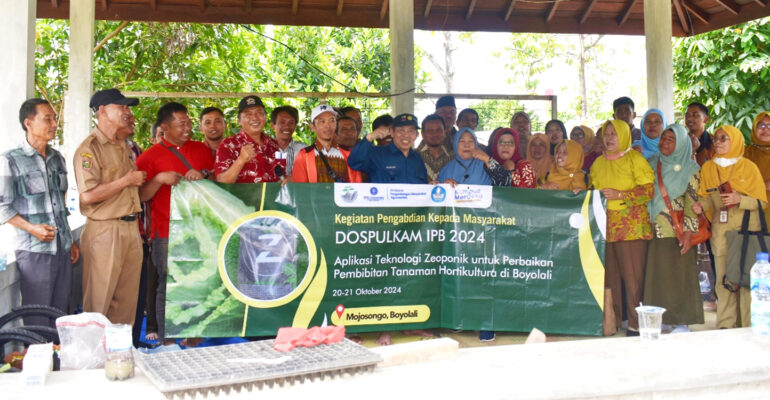IPB University Lecturer Transmits Zeoponic Media Innovation in Boyolali’s Hometown

Dr Suwardi and a team of IPB University lecturers introduced the Zeoponic planting media innovation to horticultural farmers in Mojosongo District, Boyolali, Central Java. The activity that took place at the Mojosongo Agricultural Extension Office (BPP) was part of the Dosen Pulang Kampung (Dospulkam) 2024 program which was initiated to share knowledge and technology with the community in the hometown of IPB University lecturers.
The introduction of Zeoponic media was opened directly by the Chief of Mojosongo Sub-District, Sabdo Haryono, and attended by representatives of the Boyolali Regency Agriculture Office, represented by the Chief of Extension, Joko Susanto. The presence of both officials shows the full support of the local government for this innovation, which is expected to help increase the productivity of farmers in the region.
In the event, Dr Suwardi delivered a complete presentation about Zeoponic media, starting from the ingredients, the criteria for ideal planting media, to the results of research that has been developed by his team. Zeoponik itself is a planting medium based on zeolite, compost, cocopeat, and fertilizer specifically designed to improve the growth of horticultural plant seedlings.
“One of the advantages of Zeoponik is its ability to maintain the electrical conductivity (EC) of the media remains low, even though it is given a large amount of fertilizer. Thus, plant seedlings can grow more optimally because the necessary nutrients are available in stable conditions,” he explained.
Not only limited to theory, the farmers were also invited to directly practice making Zeoponic under the guidance of the team. They learned how to mix ingredients, measure EC and pH, and how to store the finished Zeoponic. This practicum activity received high enthusiasm from around 30 farmers who attended. They were representatives from farmer group associations (Gapoktan) and women farmer groups (KWT) in Mojosongo sub-district.
Wagio, one of the participants who is also a horticultural farmer, expressed his excitement for this opportunity. “Very useful and interesting. I will try this media (Zeoponik) for kates (papaya) nursery,” he said. The positive response from the farmers indicates that Zeoponik has great potential to be adopted as an alternative growing medium in this area.
The Zeoponic innovation is expected to help farmers in Mojosongo, especially in breeding higher quality horticultural crops. The Boyolali District Agriculture Office also welcomed the introduction of this technology and plans to provide assistance for farmers who want to try Zeoponic as a growing medium.
Through this innovation, Dr Suwandi hopes that he and a team of IPB University lecturers can play a role in supporting food security and increasing the income of local farmers. In addition to providing an efficient alternative planting medium, this activity is also a concrete proof of the contribution of higher education in empowering the community through science and technology.
“Through the Dospukam program, it is expected that there will be more similar innovations that can have a direct impact on the community. Zeoponic technology is just one of the many agricultural innovations developed by IPB University to support sustainable agricultural development in Indonesia,” said Dr Suwandi. (IAAS/SNI)



